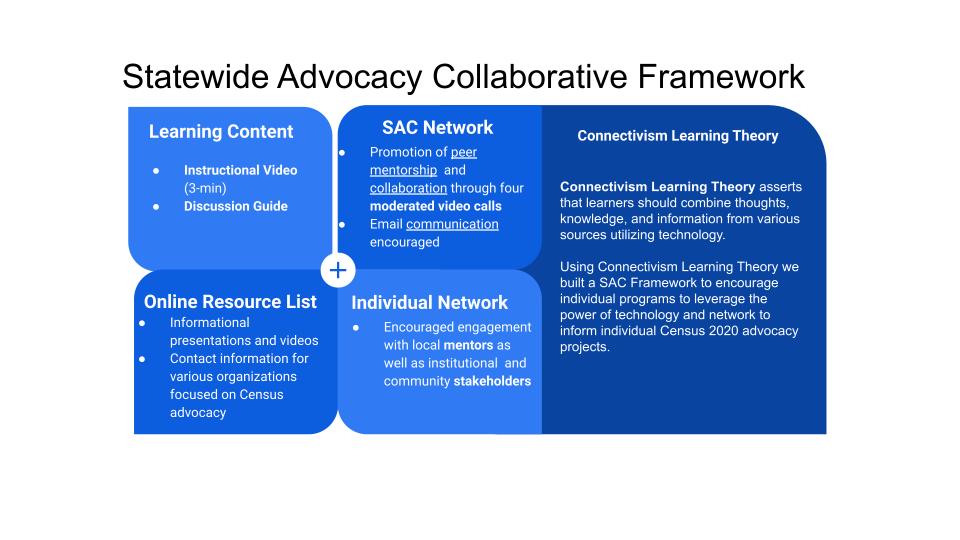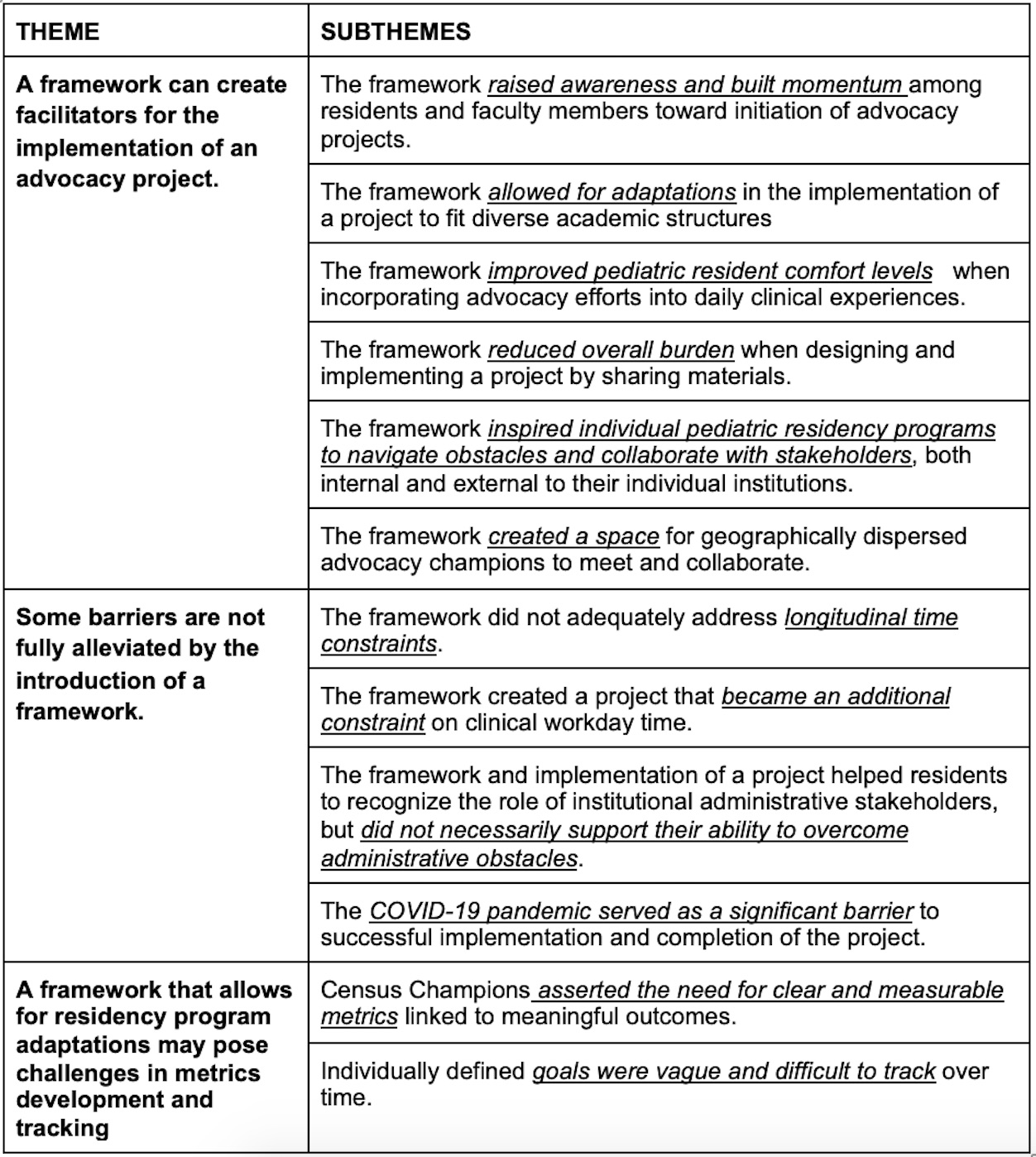Back
Medical Education: Resident
Category: Abstract Submission
Medical Education 13 - Medical Education: Resident IV
263 - Qualitative content analysis of a Statewide Advocacy Collaborative Framework: A once in a decade opportunity
Monday, April 25, 2022
3:30 PM – 6:00 PM US MT
Poster Number: 263
Publication Number: 263.419
Publication Number: 263.419
Lauren Gambill, University of Texas at Austin Dell Medical School, Austin, TX, United States; Jennifer Duc, University of Texas at Austin Dell Medical School, Austin, TX, United States; Hilda Loria, University of Texas Southwestern Medical School, Dallas, TX, United States; Ruchi Kaushik, Baylor College of Medicine, Children's Hospital of San Antonio, San Antonio, TX, United States
.jpg)
Ruchi Kaushik, MD MEd MPH
Medical Director of Education and Research
Imagine Pediatrics
Bellaire, Texas, United States
Presenting Author(s)
Background: Advocacy education is integral to general pediatrics residency training. Resident participation in advocacy projects are noted to improve resident knowledge, skills, attitudes, self-efficacy, and engagement with overwhelmingly positive learner feedback. Barriers arise, however, in the implementation of advocacy projects at the individual residency program level. Little is known about the potential impact of Statewide Advocacy Collaborative (SAC) Frameworks on advocacy project implementation, particularly for multi-site projects.
Objective: To qualitatively examine the impact of a SAC Framework on the implementation of 2020 Census advocacy projects at individual residency programs.
Design/Methods: Texas Educators in Advocacy and Community Health (TEACH TX) is a SAC that aims to advance and disseminate advocacy education and support scholarly advocacy activity for 13 Texas pediatric residency programs. Using Connectivism Learning Theory, we designed a framework that included an animated 2020 Census Instructional Video, a Discussion Guide, and a Census Resource List. We recruited programs via listserv email, presented the framework, and facilitated monthly phone calls. Semi-structured interviews of faculty and residents at participating residency programs were conducted. Four co-authors collected and analyzed interview data using an iterative qualitative content analysis approach.
Results: Seven programs opted to utilize the Framework and six programs agreed to participate in interviews. Programs exhibited geographic, size, and structure diversity. All participating programs implemented a 2020 Census advocacy project. We identified the following themes upon interview content analysis: a SAC Framework 1) can create facilitators for the implementation of an advocacy project; 2) does not fully alleviate certain barriers to the implementation of advocacy projects, and 3) specifically may not overcome challenges in metric development and tracking when it allows for residency program adaptations.
Facilitators included awareness, momentum, adaptability, self-efficacy, reduced burden, inspiration to collaborate with stakeholders, and a space to collaborate. Barriers included time constraints, administrative hurdles, and COVID19. Despite support afforded by SAC’s adaptable and less structured framework, programs found measuring and tracking of outcomes challenging.Conclusion(s): A SAC Framework facilitates pediatric residency program implementation of advocacy projects; however, barriers remain and frameworks should allow for adaptability and guidance in identifying and tracking measurable outcomes.
Statewide Advocacy Collaborative Framework
Qualitative Content Analysis of a SAC Framework for Census 2020 Advocacy Projects: Themes and Subthemes
Objective: To qualitatively examine the impact of a SAC Framework on the implementation of 2020 Census advocacy projects at individual residency programs.
Design/Methods: Texas Educators in Advocacy and Community Health (TEACH TX) is a SAC that aims to advance and disseminate advocacy education and support scholarly advocacy activity for 13 Texas pediatric residency programs. Using Connectivism Learning Theory, we designed a framework that included an animated 2020 Census Instructional Video, a Discussion Guide, and a Census Resource List. We recruited programs via listserv email, presented the framework, and facilitated monthly phone calls. Semi-structured interviews of faculty and residents at participating residency programs were conducted. Four co-authors collected and analyzed interview data using an iterative qualitative content analysis approach.
Results: Seven programs opted to utilize the Framework and six programs agreed to participate in interviews. Programs exhibited geographic, size, and structure diversity. All participating programs implemented a 2020 Census advocacy project. We identified the following themes upon interview content analysis: a SAC Framework 1) can create facilitators for the implementation of an advocacy project; 2) does not fully alleviate certain barriers to the implementation of advocacy projects, and 3) specifically may not overcome challenges in metric development and tracking when it allows for residency program adaptations.
Facilitators included awareness, momentum, adaptability, self-efficacy, reduced burden, inspiration to collaborate with stakeholders, and a space to collaborate. Barriers included time constraints, administrative hurdles, and COVID19. Despite support afforded by SAC’s adaptable and less structured framework, programs found measuring and tracking of outcomes challenging.Conclusion(s): A SAC Framework facilitates pediatric residency program implementation of advocacy projects; however, barriers remain and frameworks should allow for adaptability and guidance in identifying and tracking measurable outcomes.
Statewide Advocacy Collaborative Framework

Qualitative Content Analysis of a SAC Framework for Census 2020 Advocacy Projects: Themes and Subthemes

